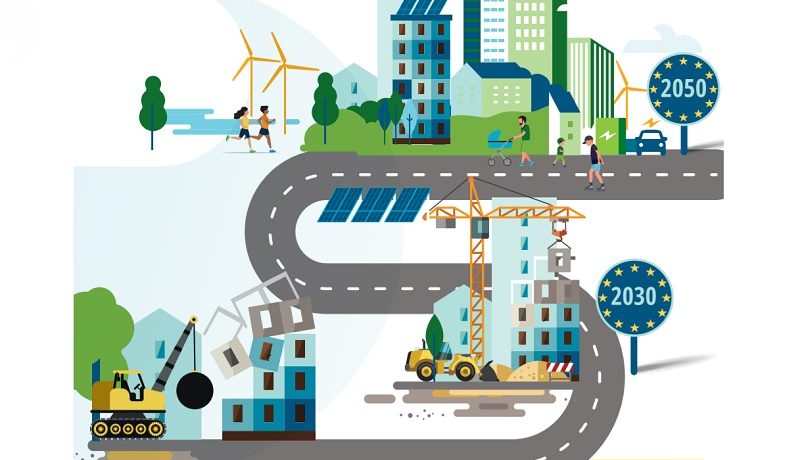Roadmap climate-proof buildings and construction EPBD (Energy Performance of Buildings Directive) should set requirements to reduce whole-life carbon emissions of EU building stock, says BPIE
Carbon emissions across the whole lifecycle of buildings must be immediately reduced if we are to meet Europe’s climate targets for 2030.
A new policy roadmap from BPIE argues that the EPBD (Energy Performance of Buildings Directive) recast should ensure a comprehensive vision of a carbon neutral building and construction sector which takes into account whole lifecycle carbon emissions of a building.
Despite an array of national initiatives, voluntary schemes and regulations, EU legislation is not designed to address all sources of carbon emissions from buildings and construction. Most existing policies focus on curtailing carbon emissions by managing and reducing operational emissions (energy consumption in buildings’ use phase), leaving out the significant mitigation potential of embodied emissions (those resulting from the production, installation, maintenance and disposal of building materials). Embodied emissions in buildings need to be tackled in order for them not to undermine the carbon reductions achieved from the energy saving measures in the building sector.
BPIE’s roadmap argues that the 2022 recast of the EPBD (Energy Performance of Buildings Directive) is an essential opportunity to set the requirements and clear triggers to reduce whole-life carbon emissions of the building stock.
“The EPBD is the single most important legislation targeting buildings and should reinforce the urgency to set the buildings and construction sector on the path to net zero carbon by 2050,” says BPIE Executive Director Oliver Rapf. “The current reference to a highly efficient and decarbonised building stock should be complemented by the necessity to reduce carbon across a building’s entire life cycle.”
While it is important to improve the energy efficiency of buildings, the measures risk being suboptimal without a clear understanding of the embodied carbon footprint of buildings. A first step to regulate whole life carbon is to measure it.
Additionally, it is necessary to set voluntary targets based on common standards, agreed methodologies and consistent carbon data sources. New construction should be required to assess and disclose information on embodied carbon emissions.
Making whole-life carbon reporting mandatory will facilitate data collection and benchmarking and will allow the construction sector to develop the necessary skills and capacity. Mandatory minimum whole-life carbon standards will have to be introduced and strengthened over time.
However, BPIE cautions that a lack of synchronisation in the EU policy timeline runs the risk that policies addressing and affecting the different stages of the construction value chain will not be coordinated.
The EPBD recast, for example, takes place before carbon benchmarks and before an EU-wide whole-life carbon trajectory will be available to guide how all emissions related to buildings can and should be reduced.
“The EPBD must now, at minimum, set out a strong vision for whole-life cycle carbon of buildings and construction, that ensures a consistent, step-wise approach and timely implementation of the sequences of recommended actions,” stresses Rapf. “Waiting for the 2027 revision will be too late.”
BPIE (Buildings Performance Institute Europe) is a leading independent centre of expertise on energy performance of buildings, providing data-driven and actionable policy analysis, advice, and implementation support to decision-makers in the public, private, and non-profit sectors. Founded in 2010, BPIE combines expertise on energy efficiency, renewable energy technologies, and health and indoor environment with a deep understanding of EU policies and processes.
A not-for-profit think-tank based in Brussels and Berlin, our mission is to make an affordable, climate-neutral built environment a reality in Europe and globally.
– BYinnovation is Media Partner of BPIE

